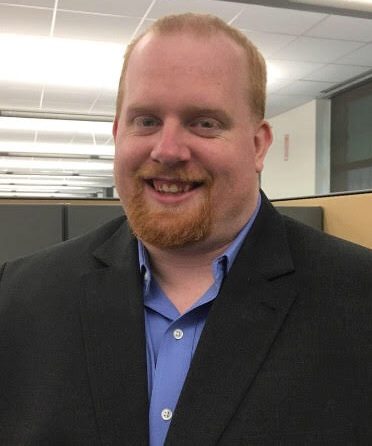(WACO, Texas) – Travis Pitrucha grew up in Temple and graduated in 2018 from Texas State Technical College with an Associate of Applied Science degree in Computer Programming Technology. He was hired after graduation at Citibank in Irving, where he is a senior software engineer.
Pitrucha’s work involves developing and maintaining a series of small programs called microservices that provide critical information to Citibank’s online, Internetwork Operating System and Android mobile apps. He is also responsible for all of the bank’s reward programs.
What inspired you to study Computer Programming Technology at TSTC?
I wanted to learn programming and not everything else that typically comes included with a degree at larger universities. I also didn’t have the money for four years at a university. By going to TSTC, it let me learn the skills, get into the workforce and become financially stable enough to then go back and get the larger degree.
How did TSTC prepare you for going into the computer programming field?
I knew I wanted to go into this field, but knowing where to start is where TSTC came into play. The biggest thing TSTC left me with is how to find information. Learning all the different computer languages is secondary to learning how to properly use Google.
What motivates you to wake up each morning and go to work?
At Citibank, we are put in charge of an aspect of the bank. For me and my team, it’s rewards and earnings. You have some ownership of what you develop. If there is an issue, you fix it. Your team relies on you, and you succeed or fail as a team. This motivates me to work every day. The pay is also really, really good.
What is a typical workday like for you?
Our workday is broken into two blocks a day, a six-hour period of development work and a two-hour period of time set aside for meetings and training. Every day at 9 a.m. there is a small group call when we go over progress with our ongoing tasks. You then start working on your stories. A story is a task that has been planned and typically assigned to you at the start of the month.
Our tasks range from testing out our code and user influence elements and monitoring traffic in the production environment, to developing and designing new features. One day of the week, I actually get to write code, with everything else being design and planning.
Working at an enterprise level, an error that happens 0.01 percent of the time is not good enough. Our code is used billions of times a week. When you work with volume this high, small errors affect a lot of people. Everything must be planned, checked and validated.
How do you keep up to date on changes in the computer programming field?
Programming is such a large field, and what you do will vary. If you are working for a startup company or a company that develops new technology, you will be on the front end of the rapidly advancing field. Doing something in a new way or using the latest thing will give your company an edge. So, following the latest trend is almost in the job description.
Now, if your job is not developing new technology and you work more on the services end, this includes every other business in the world. You develop and work on an enterprise level. Billion-dollar companies value stability and resiliency so much that by the time you get to use something, it’s several years old. Making and keeping up with the latest thing is something you need to do in your free time.
Why is computer programming the best field for graduates to pursue?
We live in a digital world. Every single aspect of that world runs on computer code. If there is not code running on it, then code was used to make it. If you want to make something as a computer programmer, you can literally make it into existence. There is no limit. Because of this limitless potential, there are a lot of jobs available right now in the United States.
According to the U.S. Department of Labor’s CareerOneStop website, software developers and software quality assurance analysts and testers in Texas make a yearly median salary of more than $108,000. Jobs are concentrated in the Austin, Dallas-Fort Worth, Houston and San Antonio areas.
The U.S. Bureau of Labor Statistics predicts that more than 1.7 million software developers and software quality assurance analysts and testers will be needed nationwide by 2029.
Registration for the fall semester continues, and scholarships are available. For more information, go to tstc.edu.
